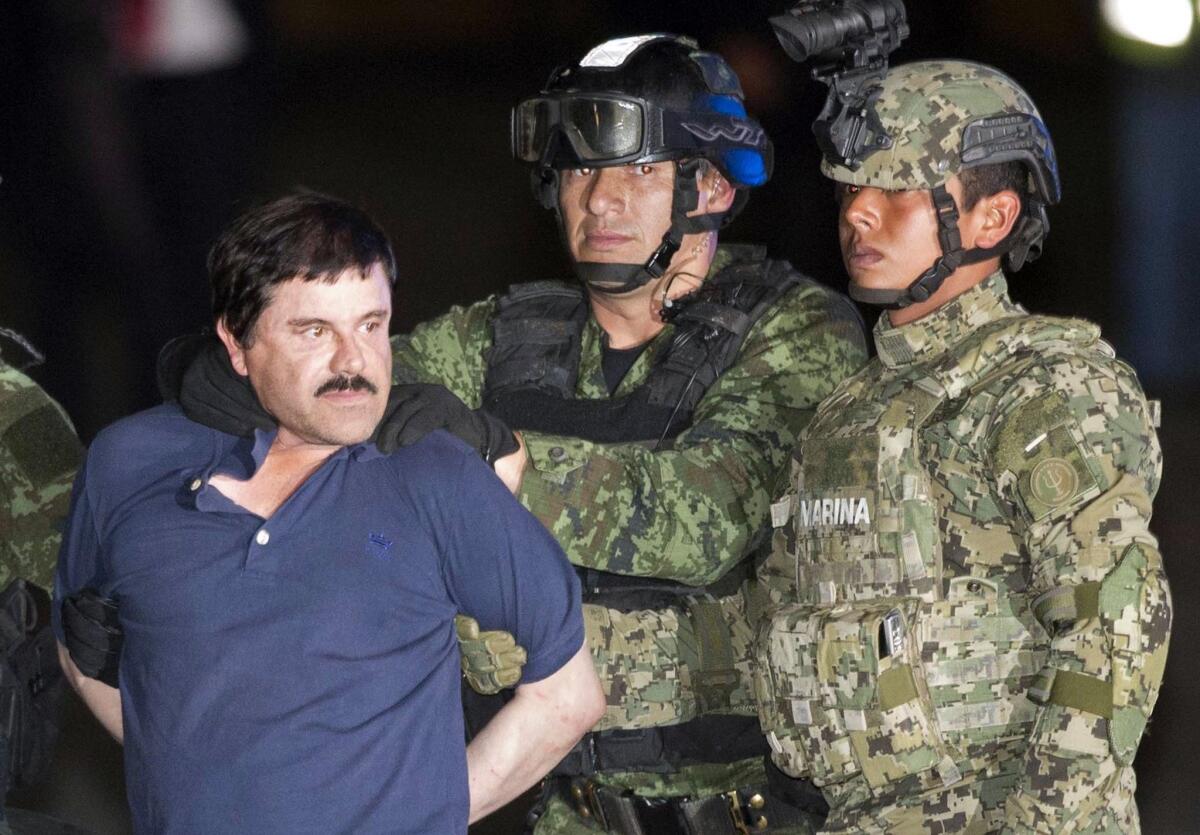Editorial: Don’t blow the ‘El Chapo’ extradition with politics

Joaquin “El Chapo” Guzman is escorted to a helicopter in handcuffs by soldiers and marines at a federal hangar in Mexico City on Jan. 8.
- Share via
A massive drug empire spanning North and South America that delivered untold tons of heroin and cocaine from Colombia to the U.S. over two decades via sophisticated cross-border tunnels, private 747s and submarines. Intimidation, bribery and murder in two countries. And, finally, the recapture of the world’s most infamous drug lord, in part due to a visit by a pair of celebrities — and a big order of tacos delivered to his hide-out.
With allegations like these, what federal prosecutor in the U.S. wouldn’t want to be the first to try Joaquin “El Chapo” Guzman when Mexican authorities extradite him to this country? The seven jurisdictions that have filed indictments against him and other alleged leaders and associates of the Sinaloa cartel had begun competing to get the first shot at him even before Guzman’s second prison break in July.
Mexicans are counting on the U.S. to be able to do what their justice system could not: Keep Guzmán in jail.
U.S. Atty. Gen. Loretta Lynch, who will ultimately decide, will be feeling political pressure from U.S. attorney offices in Chicago, Miami, El Paso and San Diego — and two in New York. Maybe even New Hampshire, whose case involves a face-to-face meeting between El Chapo and an FBI informant. New York prosecutors could legitimately argue that they have expertise in putting away international bad guys. Chicago reportedly has living witnesses ready to testify. And how about some consideration for San Diego, which filed the first indictment 20 years ago, and has successfully prosecuted members of another Mexican cartel run by the Arrellano-Felix family?
Ultimately, Lynch must leave politics out of her calculation. This case is too important to lose.
Why? For one thing, Mexicans are counting on the U.S. to be able to do what their justice system could not: keep Guzman in jail while he answers to accusations about his part in decades of cartel-sponsored bloodshed and corruption. Convicting the head of just one of Mexico’s illegal drug cartels may not stop the flow of cocaine and heroin to the U.S. But bringing justice to the perpetrators for so much death and carnage is not just important symbolically; it sends a message to other drug kingpins that they are not immune.
It’s also an important case to Californians. Authorities allege that the Sinaloa cartel distributed cocaine and heroin all over the U.S., but perhaps no U.S. region was as central to the operation as Southern California. The 29-page San Diego indictment against Guzman and 22 other people describes a network of warehouses from Alondra Boulevard off Interstate 5 to Otay Mesa, which connected to Tijuana through a 1,416-foot tunnel.
The court documents read like a Where’s Where of Southern California, alleging money drops, meetings and distribution stops in such communities as Chula Vista, Cerritos, City of Industry, Baldwin Park, La Mirada, Paramount and Victorville. The cartel allegedly trucked tons of cocaine hidden in fake boxes of soap as well as chiles and other grocery products with the help of food importers Jesus, Jose and Antonio Reynoso. The case in San Diego got new life in October when Antonio Reynoso was extradited to the U.S. to face drug-trafficking charges.
It may be as long as a year before Guzman arrives in the U.S. to face charges that could range from trafficking to murder. The timing is up to new Mexican Atty. Gen. Arely Gomez Gonzalez, whose predecessor, Jesus Murrillo Karam, famously boasted that the U.S. could have Guzman after he served 300 or 400 years in a Mexican prison. Six months later, Guzman escaped from a high-security prison through a mile-long tunnel connected to his cell.
Gomez is wise to see the benefits of extradition. And she would be wiser still to expedite the process as much as possible. El Chapo’s lawyers are trying to stop extradition, claiming their client can’t get a fair trial in the United States because of anti-Mexican sentiment such as that stirred up by presidential candidate Donald Trump. And no doubt the drug lord’s engineers are already plotting a third escape in case the lawyers’ motions are thrown out and Guzman is threatened with transport to a “supermax” prison in the U.S.
In any case, there will be time enough for Lynch to do a thorough assessment of the relative strengths of the various indictments and choose the jurisdiction with the strongest charges, the most capable prosecutors and the best chance of winning their case — and ending this one bloody chapter in the long brutal drug war.
Follow the Opinion section on Twitter @latimesopinion and Facebook
More to Read
A cure for the common opinion
Get thought-provoking perspectives with our weekly newsletter.
You may occasionally receive promotional content from the Los Angeles Times.










